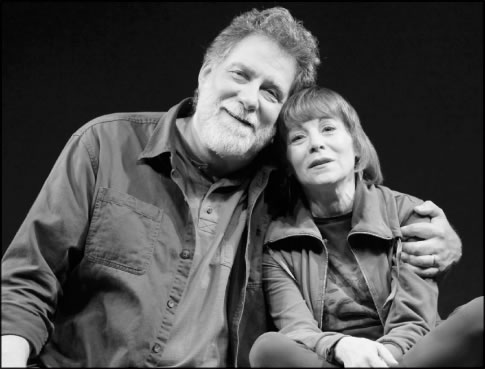BY SCOTT HARRAH
When Emmy Award-winning “MacNeil/Lehrer News Hour” essayist, Time magazine columnist and author Roger Rosenblatt was asked by the Flea Theater to write another play, he couldn’t say no.
Rosenblatt had already written two plays for the Flea. “Ashley Montana Goes Ashore in the Caicos,” produced in 2005, was a series of vignettes about everything from politics to Hurricane Katrina. In 2006, he wrote “Away in the Manger, ” a 10-minute play as part of “Twas the Night Before” — Flea’s Christmas series based on Clement C. Moore’s holiday poem.
Rosenblatt’s new one act, “The Oldsmobiles,” is a seriocomedy about a married couple (Richard Masur and Alice Playten) who sit on the Manhattan Bridge and contemplate suicide.
While scheduling the 2009/2010 season, Flea founder and artistic director Jim Simpson asked Rosenblatt to come up with another play. “So I wrote it,” Rosenblatt says in an interview the day of the show’s first preview. “It started more innocently than it wound up. I thought to put two old people on a bridge together with a suicide pact and have them talk about old age and a kind of semi-serious theme about killing yourself. It’s largely a funny play and the more I wrote it, the darker it got.”
Rosenblatt has written 13 acclaimed books. His memoir “Making Toast: A Family Story” — based on an essay that appeared in The New Yorker about his 38-year-old daughter’s recent death — is due out in February, 2010.
Although more accustomed to writing books and essays, Rosenblatt admits he was equally thrilled to pen another play for the Flea.
“Working with the Flea is always a pleasure,” he says. “There’s a great advantage in dealing with a theater that doesn’t have a lot of money because first of all you have very imaginative people. Everyone at the Flea is a pleasure to deal with. I’m primarily not a playwright, so I’m just dazzled by the theater no matter what I do. I never have lost the easy pleasure of watching very gifted people take what you do and make it better.”
Rosenblatt is certain the play appeals to an older audience. “I think young people will simply laugh and say, ‘This isn’t our life,’ ” he says. “People anywhere from 55 on will look at it slightly differently, and their laughter might be tempered with some genuine fear.”
Rosenblatt had no particular actors in mind when he wrote the script. “We had readings done, ” he says. “One reading was out in Southampton with Sigourney Weaver and Alan Alda, who were great. Then they had Bill Murray and Sigourney do it in a benefit and they were also great. When Richard and Alice did it, they were great, too. One of the things I love especially about these two is they are persuasive as man and wife. For all the nuttiness and the jokes they make, you can actually believe this couple was married for thirty some years.”
Carol Ostrow, Producing Director at the Flea, says the theater was anxious to work with Rosenblatt again. “We have a relationship with lots of writers, and Roger’s one of the best,” she says. “He writes about the times in which we live and we like to think that those are the kinds of plays that we do. I think Roger recognizes that.”
Ostrow says that Rosenblatt’s work is perfect for downtown. “It’s because we are small and low budget. We don’t have subscribers. People know if they attend a show at the Flea, it will be about something that’s happening in their lives — or something they’re aware of that no one’s speaking to. All of the plays we’re doing this year are in some way or another addressing the times in which we live, and certainly Roger’s play is doing that. I think that’s what people should come downtown for.”
From November 20th to December 30th, the Flea will present “The Great Recession, Tough Plays for Tough Times” — featuring the work of Thomas Bradshaw, Sheila Callaghan, Erin Courtney, Will Eno, Itamar Moses, and Adam Rapp.
“These are six writers, all of whom we’ve produced before. We got them all together and said to write us 10-minute plays about the economic climate in which you as a young person now live in; and they did — and the plays are incredible,” she says. “They’re funny and frightening, and all wonderful.”
Despite the economy, the Flea manages to survive. “I think every theater is facing challenges,” Ostrow says. “Funding is difficult. More with less is the mantra with the Flea. We’re tightening our belts, certainly, but trying to produce excellent product. What we’re emphasizing is the writing — so you might forgive less high-tech values. We don’t have moving stages or prosceniums but what you’re seeing is terrific work, and I think New Yorkers like that.”





































